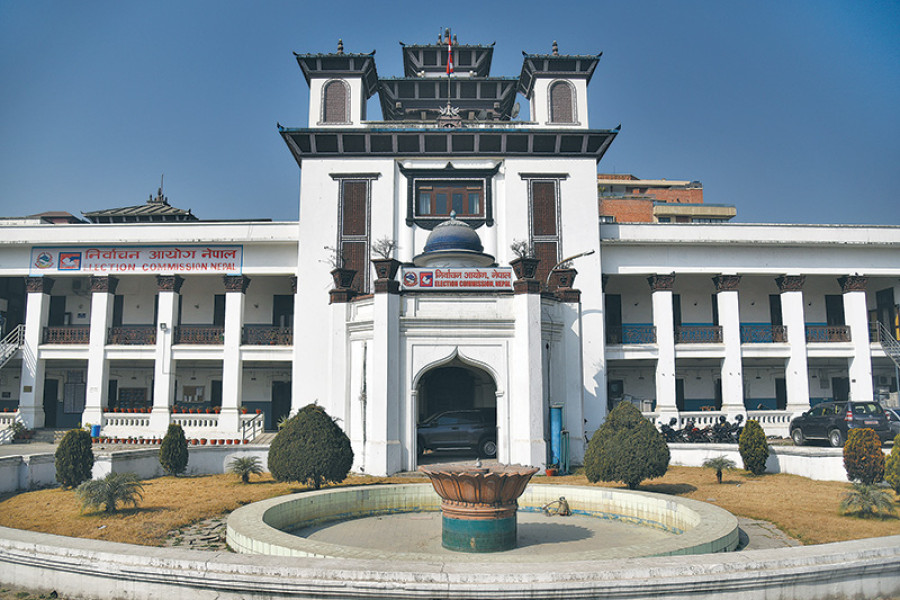National
Poll commission to discuss legitimacy claims of Dahal-Nepal faction next week
The Election Commission’s indecision has drawn widespread criticism, including from former commissioners.
Prithvi Man Shrestha
The Election Commission is set to discuss the legitimacy dispute in the ruling Nepal Communist Party next week.
The election body has been facing criticism for its delay in taking a decision to settle the dispute, particularly from Pushpa Kamal Dahal and Madhav Kumar Nepal-led faction of the party.
A group of leaders from the faction on Friday reached the commission to complain about the delay in decision making.
On March 3, four former chief commissioners and a commissioner had also urged the election body to decide the matter without any delay. They had warned that the delay will not only affect the country’s political process but also the credibility of the election body.
Faced by criticism for its alleged failure to act like an independent constitutional body, the Election Commission on Friday said that a meeting has been convened for next week to discuss the legitimacy dispute of Nepal Communist Party.
“I have directed the secretariat [of the commission] to submit the documents related to the claims made by the Dahal-Nepal faction to the meeting of the commission’s office-bearers,” Chief Election Commissioner Dinesh Thapaliya told the Post.
According to Thapaliya, the commission has not yet discussed the matter.
The Dahal-Nepal faction had formally submitted an application claiming to be the legitimate faction to represent the Nepal Communist Party on February 2.
“It is not essential to discuss the matter right after the application has been submitted,” Thapaliya said.
The Dahal-Nepal faction has staked claim to the party’s name, flag and the election symbol as per Section 44 (1) of the Political Parties Act-2017.
The Section 44 (1) of the Political Parties Act-2017 states that a faction that claims the original party, stamp, flag and symbol needs to submit papers with all the documents to the commission along with the signatures of at least 40 percent Central Committee members within 30 days after dispute arises in the party.
After the application is submitted, the commission needs to seek a written response from the rival faction by serving a 15-day deadline as per the section 44 (2) of the Act.
The election body has not yet sought any feedback from the Oli faction of Nepal Communist Party, which was confirmed by Raj Kumar Shrestha, spokesperson of the commission.
The election body has not clarified whether it will proceed ahead by seeking feedback from the Oli faction after next week’s meeting.
Chief Commissioner Thapaliya has only said that the issue will enter into the discussion process. He reportedly communicated the same statement to the leaders of the Dahal-Nepal faction on Friday.
“The commission told us that it will take ahead the process of the dispute from its meeting early next week,” Lilamani Pokharel, a leader representing the Dahal-Nepal faction, told the Post.
If the commission decides to move ahead as per Section 44 of the Political Parties Act-2017, it will seek response from the Oli faction regarding the claims made by the Dahal-Nepal faction. After studying the response, the commission will invite both sides and ask them to settle the dispute mutually.
Only if the warring factions fail to settle the dispute, the commission needs to give legitimacy to the faction that can prove its majority in the Central Committee that existed before the dispute arose. The rival faction will be asked to register a new party as per Section 44 (6) of the Act.
In its application to the commission, the Dahal-Nepal faction has claimed that it has the majority in the party’s Central Committee. But the commission did not move the process of settling the dispute.
Leaders from the Dahal-Nepal faction suspect whether the commission, despite being an independent constitutional body, is being influenced by the executive.
“Our reading regarding the commission’s indecision is that it appears to be under the influence of the executive. The prime minister has been threatening the commission,” said Pokharel.
The Dahal-Nepal faction has been on a dogged pursuit to get the dispute settled.
“In our Friday’s letter to the commission, we have expressed our displeasure over the commission’s delay in settling the dispute despite our repeated requests,” said Pokharel, the leader from the Dahal-Nepal faction.
On January 24, the commission had refused to give legitimacy to either faction arguing that both factions failed to follow the party statute in their decision making. It had, however, recognised the 441-member Central Committee set up after the Nepal Communist Party was formed in 2018, following the merger between the erstwhile CPN (UML) and CPN (Maoist Centre).
The commission officials have been informally telling the media that the Dahal-Nepal faction made the legitimacy claim after the 30-day deadline had expired.
Leaders from the Dahal-Nepal faction claim that they decided to settle the dispute as per Section 44 (1) of the Political Party Act only after the Election Commission concluded one process on January 24 which yielded no conclusive result.
They say they took the steps to settle the dispute within the deadline set by the law.
The dispute in Nepal Communist Party surfaced after both factions held separate Central Committee meetings on December 22—two days after President Bidya Devi Bhandari dissolved the House on the recommendation of Oli and announced snap elections.
On February 23, the Supreme Court overturned the decision of the Oli government to dissolve the House terming the move unconstitutional.




 22.12°C Kathmandu
22.12°C Kathmandu














